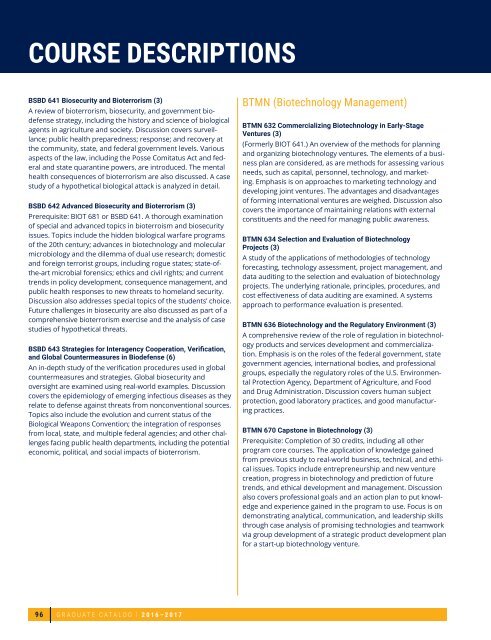2016–2017 2016–2017
2016-2017-graduate-catalog
2016-2017-graduate-catalog
Create successful ePaper yourself
Turn your PDF publications into a flip-book with our unique Google optimized e-Paper software.
COURSE DESCRIPTIONS<br />
BSBD 641 Biosecurity and Bioterrorism (3)<br />
A review of bioterrorism, biosecurity, and government biodefense<br />
strategy, including the history and science of biological<br />
agents in agriculture and society. Discussion covers surveillance;<br />
public health preparedness; response; and recovery at<br />
the community, state, and federal government levels. Various<br />
aspects of the law, including the Posse Comitatus Act and federal<br />
and state quarantine powers, are introduced. The mental<br />
health consequences of bioterrorism are also discussed. A case<br />
study of a hypothetical biological attack is analyzed in detail.<br />
BSBD 642 Advanced Biosecurity and Bioterrorism (3)<br />
Prerequisite: BIOT 681 or BSBD 641. A thorough examination<br />
of special and advanced topics in bioterroism and biosecurity<br />
issues. Topics include the hidden biological warfare programs<br />
of the 20th century; advances in biotechnology and molecular<br />
microbiology and the dilemma of dual use research; domestic<br />
and foreign terrorist groups, including rogue states; state-ofthe-art<br />
microbial forensics; ethics and civil rights; and current<br />
trends in policy development, consequence management, and<br />
public health responses to new threats to homeland security.<br />
Discussion also addresses special topics of the students’ choice.<br />
Future challenges in biosecurity are also discussed as part of a<br />
comprehensive bioterrorism exercise and the analysis of case<br />
studies of hypothetical threats.<br />
BSBD 643 Strategies for Interagency Cooperation, Verification,<br />
and Global Countermeasures in Biodefense (6)<br />
An in-depth study of the verification procedures used in global<br />
countermeasures and strategies. Global biosecurity and<br />
oversight are examined using real-world examples. Discussion<br />
covers the epidemiology of emerging infectious diseases as they<br />
relate to defense against threats from nonconventional sources.<br />
Topics also include the evolution and current status of the<br />
Biological Weapons Convention; the integration of responses<br />
from local, state, and multiple federal agencies; and other challenges<br />
facing public health departments, including the potential<br />
economic, political, and social impacts of bioterrorism.<br />
BTMN (Biotechnology Management)<br />
BTMN 632 Commercializing Biotechnology in Early-Stage<br />
Ventures (3)<br />
(Formerly BIOT 641.) An overview of the methods for planning<br />
and organizing biotechnology ventures. The elements of a business<br />
plan are considered, as are methods for assessing various<br />
needs, such as capital, personnel, technology, and marketing.<br />
Emphasis is on approaches to marketing technology and<br />
developing joint ventures. The advantages and disadvantages<br />
of forming international ventures are weighed. Discussion also<br />
covers the importance of maintaining relations with external<br />
constituents and the need for managing public awareness.<br />
BTMN 634 Selection and Evaluation of Biotechnology<br />
Projects (3)<br />
A study of the applications of methodologies of technology<br />
forecasting, technology assessment, project management, and<br />
data auditing to the selection and evaluation of biotechnology<br />
projects. The underlying rationale, principles, procedures, and<br />
cost effectiveness of data auditing are examined. A systems<br />
approach to performance evaluation is presented.<br />
BTMN 636 Biotechnology and the Regulatory Environment (3)<br />
A comprehensive review of the role of regulation in biotechnology<br />
products and services development and commercialization.<br />
Emphasis is on the roles of the federal government, state<br />
government agencies, international bodies, and professional<br />
groups, especially the regulatory roles of the U.S. Environmental<br />
Protection Agency, Department of Agriculture, and Food<br />
and Drug Administration. Discussion covers human subject<br />
protection, good laboratory practices, and good manufacturing<br />
practices.<br />
BTMN 670 Capstone in Biotechnology (3)<br />
Prerequisite: Completion of 30 credits, including all other<br />
program core courses. The application of knowledge gained<br />
from previous study to real-world business, technical, and ethical<br />
issues. Topics include entrepreneurship and new venture<br />
creation, progress in biotechnology and prediction of future<br />
trends, and ethical development and management. Discussion<br />
also covers professional goals and an action plan to put knowledge<br />
and experience gained in the program to use. Focus is on<br />
demonstrating analytical, communication, and leadership skills<br />
through case analysis of promising technologies and teamwork<br />
via group development of a strategic product development plan<br />
for a start-up biotechnology venture.<br />
96<br />
GRADUATE CATALOG | <strong>2016–2017</strong>


